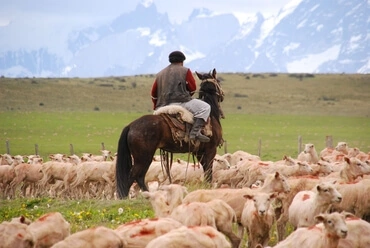1
Nogen tid efter kom de og sa til Josef: Din far er syk. Da tok han begge sine sønner med sig, Manasse og Efra'im.
2
Og de meldte det til Jakob og sa: Din sønn Josef er kommet til dig. Da gjorde Israel sig sterk og satte sig op i sengen.
3
Og Jakob sa til Josef: Den allmektige Gud åpenbarte sig for mig i Luz i Kana'ans land og velsignet mig
4
og sa til mig: Se, jeg vil gjøre dig fruktbar og tallrik og gjøre dig til en mengde folkeslag, og jeg vil gi din ætt efter dig dette land til evig eiendom.
5
Og dine to sønner som du har fått i Egyptens land, før jeg kom til dig her i Egypten, de skal nu være mine; Efra'im og Manasse skal tilhøre mig likesom
uben og Simeon.
6
Men de barn som du har fått efter dem, skal være dine; de skal kalles efter sine brødre i deres arvelodd.
7
For da jeg kom fra Mesopotamia, døde
akel fra mig i Kana'ans land på reisen, da vi ennu hadde et stykke vei igjen til Efrat; og jeg begravde henne der på veien til Efrat, det er Betlehem.
8
Da Israel fikk se Josefs sønner, spurte han: Hvem er det?
9
Josef svarte sin far: Det er mine sønner, som Gud har gitt mig her. Da sa han: Kjære, kom hit til mig med dem, så vil jeg velsigne dem.
10
Men Israels øine var sløve av alderdom, han kunde ikke se; og Josef førte dem bort til ham, og han kysset dem og tok dem i favn.
11
Og Israel sa til Josef: Jeg hadde ikke tenkt å få se ditt ansikt, og nu har Gud endog latt mig få se dine barn.
12
Så førte Josef dem bort fra hans knær og bøide sig til jorden for ham.
13
Siden tok Josef dem begge, Efra'im i sin høire hånd mot Israels venstre og Manasse i sin venstre hånd mot Israels høire, og førte dem frem til ham.
14
Og Israel rakte ut sin høire hånd og la den på Efra'ims hode, enda han var den yngste, og sin venstre hånd på Manasses hode; han la sine hender således med vilje, for Manasse var den førstefødte.
15
Og han velsignet Josef og sa: Den Gud for hvis åsyn mine fedre Abraham og Isak vandret, den Gud som var min hyrde, fra jeg blev til og til denne dag,
16
den engel som forløste mig fra alt ondt, han velsigne guttene, så de må kalles med mitt navn og med mine fedre Abrahams og Isaks navn, og bli meget tallrike i landet.
17
Da Josef så at hans far la sin høire hånd på Efra'ims hode, syntes han ille om det, og han grep sin fars hånd for å føre den fra Efra'ims hode bort på Manasses hode.
18
Og Josef sa til sin far: Ikke så, far! For denne er den førstefødte; legg din høire hånd på hans hode!
19
Men hans far vilde ikke det, og han sa: Jeg vet det, min sønn, jeg vet det. Han skal og bli et folk, han skal og bli stor; men enda skal hans yngre bror bli større enn han, og hans ætt skal bli en mengde folkeslag.
20
Så velsignet han dem samme dag og sa: Ved dig skal Israel velsigne og si: Gud gjøre dig som Efra'im og som Manasse! Og han satte Efra'im foran Manasse.
21
Og Israel sa til Josef Se, jeg dør, men Gud skal være med eder og føre eder tilbake til eders fedres land.
22
Og jeg gir dig fremfor dine brødre et stykke land som jeg tar fra amorittenes hånd med mitt sverd og min bue.







